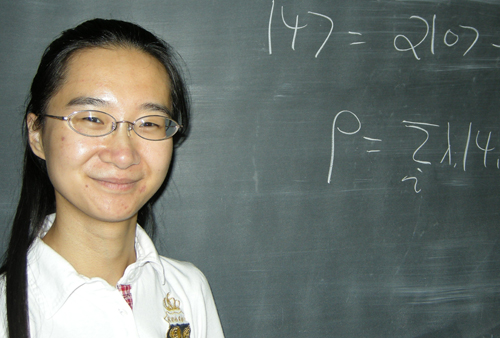
In 1997, IBM created and programmed a computer named “Deep Blue” that was able to beat Garry Kasparov, then the reigning world chess champion. The outcome of that tournament made headlines around the world. It also changed the life of a 17-year-old girl in Chengdu, China.
That girl was Bei Zeng, now a mathematics professor at U of G.
When Kasparov faced off against Deep Blue, Zeng was five years into her career as a professional chess player. She’d been named China’s national chess master when she was only 14 and won an international bronze medal the same year.
Zeng grew up as part of a chess-playing family. Her father, Zilin Zeng, was the head coach of China’s national team and had begun coaching her ─ at her request ─ when she was eight years old. Her aunt, Shilan Liu, was the first female All-Asia Chess Grandmaster.
“My dream had been to continue as a professional chess player,” says Zeng. “But after the computer beat Kasparov, I saw the limitations of that career. I decided to go to university.”
Despite not having the prerequisites, Zeng was accepted into the physics and mathematics program at China’s Tsinghua University. “It was a struggle at first; I failed my first midterm.” Hard work paid off, though, and Zeng published her first research paper in second year and graduated at the top of her class.
After moving to the United States to continue her studies at the Massachusetts Institute of Technology (MIT), she was hired as a summer intern at IBM Watson Research in the summer of 2008. She graduated from MIT in 2009 and took a post-doctoral position at the University of Waterloo.
While she was working at IBM, Zeng competed as the only female participant in an employee-sponsored chess tournament. Not surprisingly, she won.
At U of G, Zeng is a scholar in the quantum information processing program funded by the Canadian Institute for Advanced Research and conducts research in quantum computing.
What is quantum computing? “It’s the next step in computers,” says Zeng. She cites Moore’s law ─ coined by Intel co-founder Gordon Moore in 1965 ─ which states that the number of transistors that can be placed inexpensively on an integrated circuit will double approximately every two years. This has, in fact, been roughly true for computers for the past 50 years. But if it continues, Zeng explains that transistors would soon have to become as small as an atom, and we will have reached the limits of further increases in speed and capacity.
“Where will we go from there?” she asks. “It’s possible that at that point computers will simply ‘level out’ and stop improving, but it’s also possible that we will find a fundamentally different approach ─ like quantum computing.”
The concept of the quantum computer was first suggested by physicist Richard Feynman in 1981. Zeng says that in classical computing, a bit can be either one or zero. In quantum computing it can be both at the same time. “That means that quantum computers can do things incredibly quickly because they can solve equations for many possibilities all at the same time. You are computing in parallel.”
If that seems confusing, there’s more. Even though the computer is running many equations at once, you can only retrieve one answer. There are also high error rates. The computer itself would be very fragile, Zeng adds. “Once it’s exposed to the environment, you lose the quantumness and it becomes a classic computer. In fact, in 1996 some physicists said that the quantum computer can never be built.”
But Zeng and her colleagues don’t agree. She quotes MIT professor Peter Shor who says: “There are no real hard problems in the world; we are simply not smart enough.” Zeng’s goal is to get smarter by continuing to research the problems and finding solutions.
“There’s currently a big gap between the theory and the reality,” she admits. “My work is on the theory side, trying to push towards the reality. Some of my colleagues are working on the reality side, trying to push towards the theory. When we solve these problems, then we’ll have a quantum computer.”
When she’s not wrestling with these complex mathematical theories, Zeng enjoys spending time with her 15-month-old son, who was born just two weeks after she graduated. She also loves to cook, especially the spicy meals that the Szechuan part of China where she grew up is famous for. “It’s harder to have friends over for dinner now, though, because the baby’s things take up all the room,” she says.
And does she still play chess? Not often. “I love chess so much, but I play it with intense concentration and focus. I don’t play for fun. Now I put that focus and time into my research instead,” she says. On the other hand, she has no doubts that she could beat pretty much anyone brave enough to take her on. “You never forget,” she says.